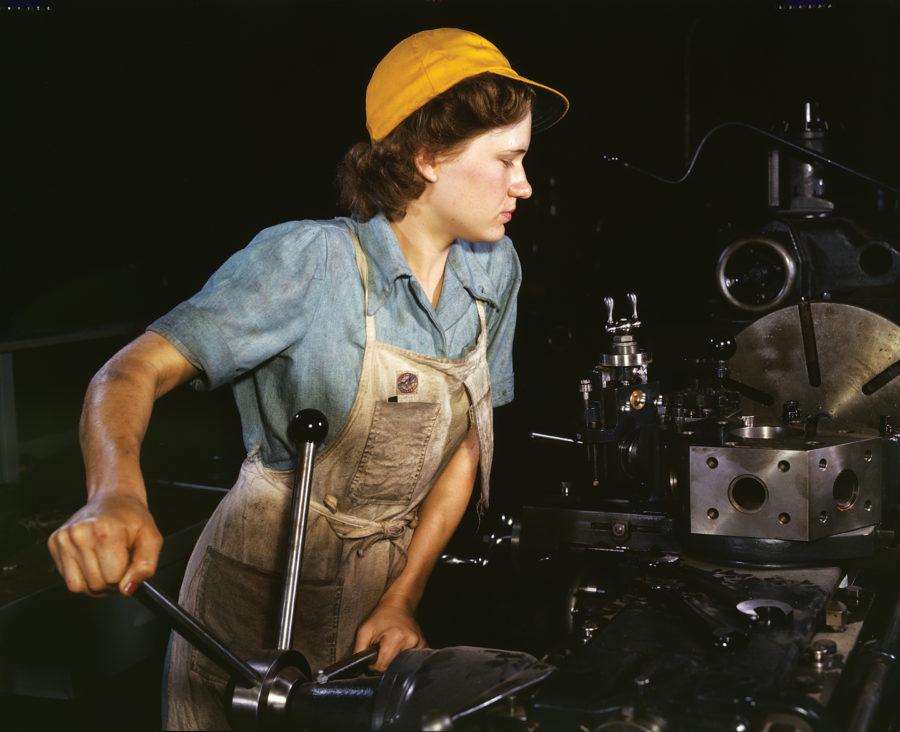Sturgis: Lack of positive reinforcement leads to shortage of female engineers
Courtesy photo: Library of Congress
A Lathe operator machines parts for transport planes at the Consolidated Aircraft Corporation plant, Fort Worth, Texas, in 1942. Columnist Sturgis believes that society is still a large factor in why women are not nearly as active in fields like engineering and mathematics.
March 22, 2011
In high school, I took for granted the fairly even split of genders in my classrooms. My first engineering class was somewhat of a shock for me. According to the Program for Women in Science and Engineering, the percentage of women in engineering at Iowa State University has never reached 20 percent. This overwhelming majority of engineering students being of the male persuasion has been a huge issue for WISE, the Society of Women Engineers and the College of Engineering for many years — and it should be.
I’m personally a member of the College of Engineering and a former member of WISE and SWE. They all offer lots of programs to try to help women succeed in engineering, including tutoring, mentors, learning communities and networking opportunities. All of these are fine things, but in general, they tend to focus on the symptoms and not the cause of difficulty for women in engineering. And those programs that isolate a gender are just silly; not learning how to function with men is not an advantage.
You see, the lack of other females to keep me company has never really bothered me. I’ve always gotten along better with the opposite gender anyway. And it’s not that we’re any less capable than our male counterparts. There are always ample opportunities to join engineering clubs and make friends, so we’re not hermits depressed by our loneliness.
At this point, you might be wondering what to blame, if these things are not the cause. Do what I do in these situations. Blame society. This time, I think we can actually get away with that accusation.
My parents’ intention when raising me was to create a civil, polite, law-abiding young woman to enter society. I have a general desire to make them proud. I also have a general desire to occasionally conform to the social norms of what it means to be female. I have desires to look pretty and stand up straight and be well spoken and sometimes polite. Sometimes I wear pretty clothes, or go get pedicures or even put on makeup or watch chick flicks and eat lots of chocolate and cry for no reason.
These are neither bad things nor confined to those of the female persuasion. They simply are.
Yet all of those things are associated not only with females, but with the very idea of being “girly.” And here is the root of the issue. Engineering is rarely “girly.”
Engineering is hands-on and dirty. It’s full of equations and science and building things from scratch and other things one associates as being somewhat “manly” for no other reason than that they just are. I enjoy these things, but I don’t want to be thought of as “manly.” No, I’m not the “girliest girl,” but on my least “girly” day I don’t want anyone thinking of me as manly.
But there is a danger in acting or being too “girly.” There is an inherent knowledge that the more “girly” a person tends to be in engineering, the less respect and validation is easily attainable for that person. There is an old stereotype that the prettier a girl is, the dumber she is. People don’t often actively further this idea, but it is alive and well in the college and in society. One has to fight to attain the same level of respect automatically given to others. One has to fight to be listened to and fight to be a leader. But woe to the person who fights too hard and then is forever labeled a, well, let’s say “witch.”
The reason there are so few women who are engineers is that such a fine line between all of these things is hard to balance. It takes a special kind of woman. The idea of “weeder” classes, meant to work a student hard, in which many do poorly, do not help.
It has been shown that negative motivation, such as telling yourself that you suck so you’ll work harder, works on the masculine psyche. For, females negative motivation just makes us depressed. Girls, this is the number one reason you should stop calling yourself fat and start calling yourself beautiful. We tend to need positive reinforcement to excel.
Positive reinforcement, compassion and other “girly” things are in such short supply in the College of Engineering; it follows that there should also be a shortage of girls.







